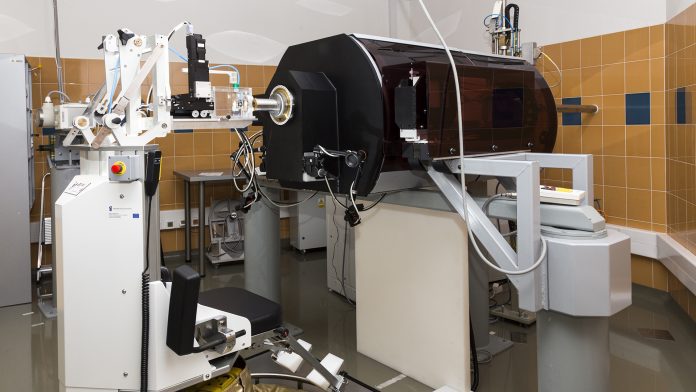
A new trial testing the benefits of proton beam therapy for breast cancer patients will go ahead for the first time in the UK.
The trial has been funded by a Medical Research Council (MRC) and NIHR partnership. Researchers from the University of Cambridge and The Royal Marsden NHS Foundation Trust will lead the trial. The researchers will compare proton beam therapy against standard radiotherapy for cancer patients who are at a higher risk of long-term heart problems after radiotherapy treatment.
It is hoped that the trial will help researchers find out whether proton beam therapy can deliver adequate doses of radiotherapy to breast tissue, while at the same time, minimising off-target radiation delivery to the heart.
Radiotherapy can cause negative side effects
Over 30,000 people with breast cancer in the UK receive radiotherapy following surgery each year. Standard radiotherapy treatment for breast cancer uses high energy x-rays to kill cancer cells. Radiotherapy can lower the risk of cancer returning and also increase survival rates.
In most cases, the positive effects of standard radiotherapy outweigh the negatives. However, there is a small chance radiotherapy can lead to heart problems in later life. This is only estimated to affect 1% of all people who receive the treatment.
In certain people, the risk of heart problems may be higher than 1%. This usually because their breast tissue and the lymph nodes are close to the heart, or because they have an underlying risk of developing heart problems later in life.
How does proton beam therapy work?
Proton beam therapy works by using charged particles instead of x-rays, enabling tumours to be targeted more precisely. The researchers hope proton beam therapy will allow doctors to deliver the correct doses of radiotherapy where it is needed. They also believe it can minimise the dosage of radiation that is delivered to the heart. The therapy could also decrease the risk of early side effects, such as skin redness and changes in breast appearance.
The trial will estimate the average radiotherapy dose that the heart is likely to receive in treatment, alongside information on the patient’s age and medical history. This will be used to predict the chances of heart problems in later life.
People predicted to have at least a 2% or more potential lifetime risk of heart problems from radiotherapy will be invited to take part in the trial.
An estimated 500 people out of every 30,000 who receive radiotherapy for breast cancer will fall into this category. Participants in the trial will either receive standard radiotherapy or proton beam therapy.
The trial will include 192 participants across 22 UK sites managed by The Institute of Cancer Research. Participants will use questionnaires to record their experiences, allowing researchers to assess their side effects.
Proton beam therapy has undergone small-scale trials in other countries, however, there are no reported trials that have directly compared proton beam therapy to standard radiotherapy.
The researchers have emphasised the importance of evaluating the benefits of proton beam therapy thoroughly in a clinical trial.
“The UK is currently leading the way in developing the evidence base to demonstrate when proton beam radiotherapy can provide significant clinical benefit to some patients over conventional radiotherapy,” said Professor Jonathan Wadsley, National Specialty Lead for Radiotherapy and Imaging at the NIHR, which funded the trial.
“It is exciting to see the launch of the first trial aiming to demonstrate the benefit of this treatment for a subset of patients with breast cancer,” he concluded.







